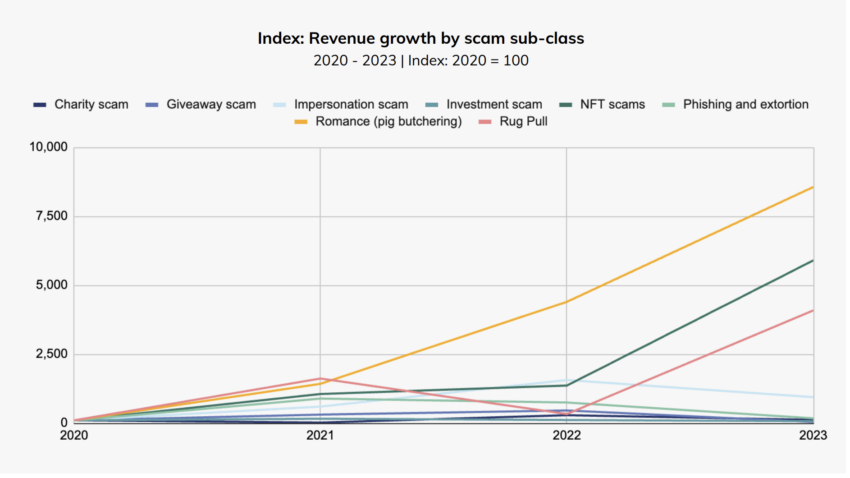The 85X Rise of Romance Crypto Scams
Romance scams prey on the lonely hearts and wallets of unsuspecting individuals.
Chainalysis reported a staggering surge in such scams, where victims, driven by the quest for love, lose millions.
How Bad Actors Steal Millions Through Romance Scam
Skilled in crafting compelling narratives, scammers target their victims through personal communication channels. Consequently, they leave behind a scant trail for authorities to track. This lack of traceability complicates the recovery of lost funds and magnifies the emotional toll on the victims.
Since 2020, the incidence of romance scams has increased eighty-fivefold, highlighting a disturbing escalation in frequency and severity.
The escalation of romance scams reflects the darker aspects of digital progress. As cryptocurrency adoption grows, so does the ingenuity of related scams. Approval phishing scams, for instance, have seen a significant rise, with losses suspected to reach $374 million in 2023. These scams involve tricking victims into granting access to their crypto wallets under the guise of legitimacy.
“Approval phishing scammers have historically targeted wide swaths of crypto users through the proliferation of fake crypto
apps, romance scammers (also known as pig butchering scammers) appear to have adopted this technique to great effect in recent years,” Chainalysis explained.
Read more: 15 Most Common Crypto Scams To Look Out For

Unfortunately, cryptocurrency, favored for its privacy and decentralization features, has become the currency of choice for these fraudsters. Indeed, its digital nature and the anonymity it affords make it a preferred medium for carrying out scams.
A notable instance is the infamous KK Park in Myanmar, a center for “pig butchering” scams. This term aptly describes the process of leading victims before financially exploiting them. Linked to over $100 million in stolen funds, this facility coerced families into paying ransoms in cryptocurrency for the release of trafficked loved ones.
One of the notable personal stories includes an Indian software engineer who lost over $120,500 to a scam encountered on a matrimonial website. The scammer, posing as a UK-based businessperson, promised lucrative returns on a crypto investment, leading to a substantial financial loss for the victim. Stories like these are becoming increasingly common, underscoring the dangers of digital interactions.
Read more: Crypto Social Media Scams: How to Stay Safe
According to Chainalysis, the total amount accumulated by scam wallets in 2023 reached at least $4.6 billion. While this marks a decrease from previous years, these figures are likely conservative estimates. Many scam activities go undetected due to the inherent challenges in identifying fraudulent blockchain addresses.
Disclaimer
All the information contained on our website is published in good faith and for general information purposes only. Any action the reader takes upon the information found on our website is strictly at their own risk.


